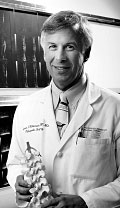What really works? Study hopes to solve back-pain conundrum
In spite of the fact that back pain is one of the most common ailments in modern society, there is little evidence about how best to diagnose and treat it. A new study directed by James Weinstein, D.O., M.S., medical director of DHMC's Spine Center, promises to answer at least part of the back-pain conundrum: are non-surgical treatments as successful as back surgery?
Funding: The study, called SPORT (Spine Patient Outcomes Research Trial), is supported by a $14.5-million grant from the National Institutes of Health, one of the largest grants ever awarded to DMS.
According to the Dartmouth Atlas of Health Care, the likelihood that a Medicare enrollee will undergo surgery for back pain varies by a factor of six— from 1.4 per 1,000 enrollees in the Bronx, N.Y., to 8.6 per 1,000 in Bend, Ore. What accounts for the differences? Researchers are convinced it isn't varying rates of disease. "We believe it's more a question of where you live and what doctor you consult," Weinstein says, "and that the differences we see reflect regional differences in medical opinion about what works."
The Dartmouth-led study expects to enroll 1,450 patients (between 200 and 300 of them at DHMC) at 11 medical centers nationwide. The patients will be randomized to receive either surgical or nonsurgical treatment. Nonsurgical options include bed rest, physical therapy, exercise, injections, oral anti-inflammatory drugs, and other non-narcotic medications.
The primary criteria for participation in the study are diagnoses of herniated disc, spinal stenosis, or degenerative spondylolisthesis; symptoms of low-back pain radiating into the buttock, thigh, or leg on walking or sitting; or loss of sensation or weakness in the leg. Those who have had previous back surgery and pregnant women will be excluded from the study.
The researchers will then collect data on participants' health status, ability to function, satisfaction with their health, and subsequent utilization of healthcare services. In addition, an attempt will be made to estimate the direct and indirect costs of each case of back pain (indirect costs include such things as days of missed work). The goal is to develop a cost-benefit ratio: how much does alleviating back pain cost and which treatment gives better "bang for the buck," according to Weinstein, a professor of surgery at DMS.

|
Jim Weinstein makes no bones about his hope of better understanding how to treat back pain. Photo: Flying Squirrel Graphics |
Satisfaction: Because not all patients will want to be randomized, an additional 1,800 will be allowed to make their own treatment choices but will be followed similarly. Data on how satisfied patients are with a choice they've made themselves can then be compared to satisfaction among randomized patients.
Weinstein—whose general reluctance to treat back pain surgically is reflected in the relatively low rate of back surgery locally (2.1 per 1,000 Medicare enrollees, compared to a national average of 3.1)—is also director of DHMC's Center for Shared Decision-Making. There, patients can get information about their condition, data about the likely outcomes of various treatment options, and support for being part of a decision-making team with their doctors.
"We're trying to help patients become better consumers of health care," says Weinstein, "by giving them enough information that they can participate in decision- making in an informed way. SPORT will give us valuable information about the outcomes of back surgery, so that people with low-back pain can make choices based on the best scientific evidence of . . . what the trade-offs are among the various treatment options."
Megan McAndrew Cooper
If you would like to offer any feedback about this article, we would welcome getting your comments at DartMed@Dartmouth.edu.
